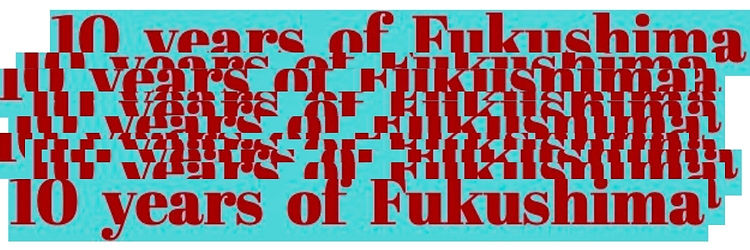PHILOSOPHY
|
POLITICS
Fukushima is Not Alone
26 MARCH 2020
There are certain proper names of places — Fukushima, Hiroshima, Auschwitz, Timbuktu, Chernobyl, Marichjhapi, Hong Kong, Tulsa, Palmyra, Gujarat, Kilvenmani, others — which lift off from the land to hover over other words while resisting to be just another word; they haunt other places to remind them to never become them. They ask us to remain alert to the call of another place without locus, which has no name yet for it. The question being asked ten years after Fukushima in this special issue of March 2021 through the unusual writings gathered here—certainly unusual for philosophical discourse which speaks often without restraint— is the meaning of what it means to say “Fukushima is not alone”.

here are certain dates which detach from the binding of time and move across the tenses—1917, 1921, 1776, 347 BCE, 19 March 2003, May 1968, 1st November. These dates without places could mean many things across the regions of the world, as we continue to mistake the world for them — regions!
In the same way, the places—Hiroshima, Auschwitz, Timbuktu, Chernobyl, Marichjhapi, Hong Kong, Tulsa, Nagasaki, Palmyra, Fukushima, Gujarat, Kilvenmani, others. Certain proper names of places lift off from the land to hover over other words while resisting to be just another word; they haunt other places to remind them to never become them. There is still no end to the spectres and ghosts of our own making, as if there is still room here for more. As if, in the words of Jacques Derrida, “the dissociation between the place where competence is exercised and the place where the stakes are located” has not “seemed more rigorous, more dangerous, more catastrophic.” (1) These places shatter our gravely false sense of the regional confinement of man.
Fukushima is not alone, and this is the quiet terror which is animating this month, March 2021. Today three places hover over Japan and together they haunt everywhere else, beginning in 6th August 1945. Through the name Fukushima, through the discipline of the act of mourning, two other names are recalled without being called out loudly. It is in the cold of this quiet terror witnessing the quiver of the pen that these texts of this month should be read.
As Jean-Luc Nancy remarked, Fukushima is also the twin experience of limits—of the limits set by nature and the limits of our technical mastery—a natural nuclear disaster.(2) Fukushima is with us, haunting without seeking to make a home anywhere, asking us only to think. To think in order to make an interval to think; it asks of “we” who have fallen in the desert of time. To ask, as Osamu Nishitani did in 2011, where is our future? (3) This is all that it wants which is however not the easiest task to achieve compared to the ease with which we still lurch for new wars which were anticipated by Hannah Arendt when she observed that with nuclear technology “the Kantian statement that nothing should happen in a war to make a later peace impossible has likewise been set on its head, so that we live in a peace in which nothing may be left undone to make a future war still possible.” (4)
The question being asked ten years after Fukushima in this special issue of March 2021 through the unusual writings gathered here—certainly unusual for philosophical discourse which speaks often without restraint— is the meaning of what it means to say “Fukushima is not alone”. Is it not-alone in the sense of Fukushima speaking to Chernobyl and the sites of nuclear tests, sites of barren time? Or is it that the people of Fukushima, offering in that name the other two names—Hiroshima and Nagasaki—to think with, are asking all of us to come over our terror to join in their decades long mourning?
These filamental places which can no longer host a sparrow nor a song are powerless to comprehend our world, either to save us from the calamities we nurture by closing our eyes to evil, or to comprehend us towards the end, the eschaton. They ask us to remain alert to the call of another place without locus, which has no name yet for it. We have to be near it when it calls our name; it will have to call us in order that we may be raised again.
What will it call us?
Editor
T
T
NOTES
1. Jacques Derrida, “No Apocalypse, Not Now (Full Speed Ahead, Seven Missiles, Seven Missives)”, trans. Catherine Porter and Philip Lewis, Diacritics 14.2, 1984: 20-31.
2. Jean-Luc Nancy, After Fukushima: The Equivalence of Catastrophes, trans. Charlotte Mandell, New York: Fordham University Press, 2015.
3. Osamu Nishitani, “Où est notre avenir ?”, Ebisu, 47, printemps-été 2012, https://doi.org/10.4000/ebisu.256 .
4. Hannah Arendt, The Promise of Politics, New York: Shocken Books, 2005.
